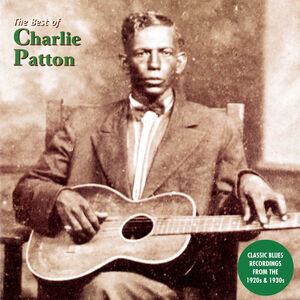Show results for
Explore
In Stock
Artists
Actors
Authors
Format
Theme
Category
Genre
Rated
Label
Specialty
Decades
Size
Color
Deals
- Blu-ray Outlet
- New Release 4K
- New Release Blu-ray
- New Release DVD
- New Release Gifts
- New Release Music
- New Release Vinyl
- Top Seller 4K
- Top Seller Blu ray
- Top Seller DVD
- Top Seller Vinyl
- top sellers all movies
- top sellers all music
- Top Selling Gifts
- TV Outlet
- Top Seller Music
- DVD Outlet
- In Stock Outlet
- Music Outlet

The Best of Charlie Patton
- Format: LP
- Release Date: 27/06/2025

The Best of Charlie Patton
- Artist: Charlie Patton
- Label: Yazoo
- Genre: Blues
- UPC: 016351206916
Product Notes
Charlie Patton (1891-1934) was the most powerful blues recording artist of all time, as well as the most subtle. He was, and re-
mains, a figure of immense significance in blues history. Rural entertainers were basically anonymous figures, or at best locally known,
when Patton took up guitar around 1907 - due to "woman troubles," he later said. At that time, Patton was a resident of Dockery, a
vast Mississippi Delta plantation that housed some four hundred tenant families. He soon eclipsed the notary of the musician, one Earl
Harris, he credited with teaching him guitar, and had (as one contemporary put it) "people just clownin' over him - they'd follow him
everywhere." By 1910 he had already established most of the themes he would record two decades later, including Pony Blues, Banty
Rooster, Down the Dirt Road and Maggie, the latter the template for most of his blues in Spanish tuning. In 1929, Patton auditioned
at Dockery for the Jackson record store owner H.C. Speir, who afterward said of him: "He beat 'em all." Following his recording debut,
he recorded more sides in a single year (43) than any blues singer who preceded him. Although he recycled his most popular themes
under various ti- tles, he almost never slavishly parroted them. Shortly after he became a blues recording celebrity, Patton was expelled
from Dockery. After 1930 he settled in the vicinity of Holly Ridge, Mississippi, living in a variety of nearby plantation towns. Just
before recording in 1934, he was arrested for drunkenness at Belzoni, an event he depicted in High Sheriff Blues. Eighty-five days
after completing his 1934 session, he died in Heathman, Mississippi, of a long-standing heart condition.
Patton's legacy is pervasive and influenced generations of blues musicians. His greatness as a singer and musician is apparent from his
very best, which obviously are among the greatest examples of rural black music ever preserved


